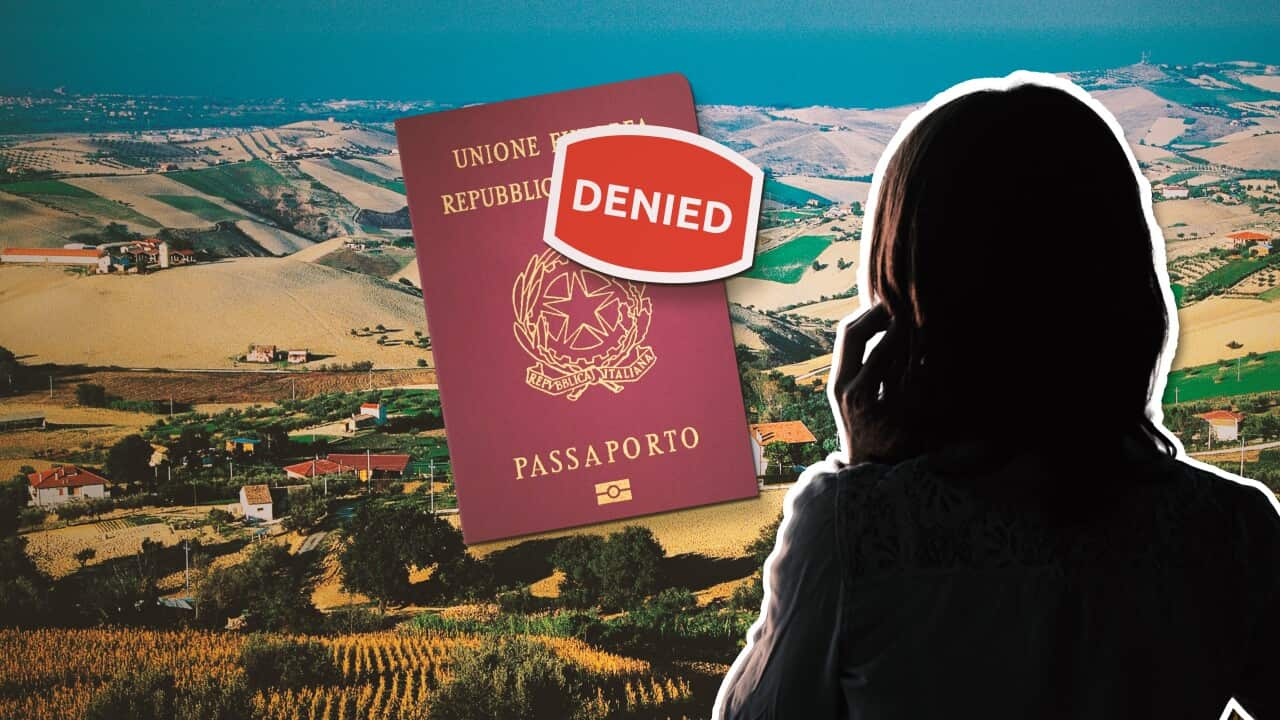A major shake-up in Italian citizenship laws has sent shockwaves through Australia's Italian community, making it significantly harder for many to obtain citizenship by descent.
The Italian government's new decree tightens eligibility criteria and imposes additional requirements on applicants. Based on the proposed new legislation, Italians living abroad can no longer apply for citizenship by demonstrating ancestry through their great-grandparents.
Maria (not her real name), who was born in Australia but gained Italian citizenship through descent, spent years navigating the citizenship process.
Reflecting on her own struggle to secure an Italian passport, she feels for other Italian-Australians who will now face even greater hurdles in attaining citizenship.
"I ended up slipping my paperwork under the door of the Italian consulate in Brisbane," she told SBS News.
"They refused to open the door for me to give them the papers in person because apparently there was no security available to be present, even though I had prearranged and confirmed my appointment.
"$700 worth of paperwork slid ominously under a door. It was such a massive gamble."
Even though Maria's application was successful in the end, it was exactly two years after Maria took the risk of leaving her paperwork at the consulate before her Italian citizenship was recognised.
She only found out she was successful by receiving a voting slip for an Italian election.
"I really feel for those who are now in limbo because so much work goes into preparing documents, not to mention costly lawyer fees, only to have the door literally shut in your face when proving your heritage," she said.
What are the changes?
Under existing rules, anyone who can prove they had an Italian ancestor who was alive after 17 March 1861, when the Kingdom of Italy was created, can seek citizenship.
But the new legislation introduces several restrictions that particularly impact applicants residing abroad:
- Italian citizenship will now be automatically granted only up to the second generation, meaning only those with at least one parent or grandparent born in Italy will be eligible
- For children born abroad to Italian citizens, automatic citizenship will apply only if one of their parents had resided in Italy for at least two continuous years before their birth
- The new rules apply retroactively from 27 March 2025 — impacting individuals regardless of their birth date.
In a statement, the Italian consulate in Melbourne said: "These reforms are part of a broader effort to modernise citizenship laws in line with contemporary migration patterns and international standards".
The changes "will free up resources to make consular services more efficient, allowing them to focus exclusively on those with a genuine need, based on their actual connection to Italy," it added.
Why did the Italian government make the change?
Italian foreign minister and deputy prime minister Antonio Tajani — a member of the conservative Forza Italia party, which governs in a coalition led by the nationalist right-wing Brothers of Italy — has defended the new rules, arguing that the citizenship process had been misused.
"Unfortunately, over the years, there have been abuses and citizenship requests that went somewhat beyond genuine interest in our country," Tajani said last week.
Italy's foreign ministry said would-be Italians have swamped consulates abroad with requests for passports, which provide visa-free entry to more countries than almost any other nationality.
Between 2014 and 2024, the number of Italians living abroad rose by 40 per cent, from 4.6 million to 6.4 million, many registering thanks to their newfound nationality, according to the foreign ministry.
Tajani said companies were making a fortune by helping people track down their long-forgotten ancestors and seek birth certificates needed for applications — clogging up municipal offices with their demands for documentation.
"We are striking down very hard against those who want to make money from the opportunity of becoming an Italian citizen," Tajani said, adding that in future, nationality requests would be handled directly in Rome to free up overburdened consulates.
Italy has a population of around 59 million, which has been shrinking over the past decade. The foreign ministry has estimated that, under the old rules, 60 to 80 million people worldwide were eligible for citizenship.
Brisbane-based Italian lawyer Fabrizio Fiorino said that both sides of politics in Italy seem to be in agreement, signalling that citizenship reforms were long overdue.
"The last time we had a citizenship reform was 1992, so Italy is overdue for change," he said.

An estimated 0.6% of Australians were born in Italy according to the ABS. Source: SBS News
Backlash from the Italian-Australian community
According to the 2021 census, just over one million Australians have Italian ancestry, and more than 160,000 Australian residents were born in Italy.
The Italian parliament has four overseas electorates, and representing citizens in Australia is Nicola Carè — the Democratic Party MP for the constituency of Africa, Asia, Oceania and the Antarctic (AAOA).
It is estimated that the AAOA electorate has 250,000 Italian citizens living abroad, with the Guardian reporting an estimated 140,000 registered Italian voters living in Australia.
Carè told Australia's Il Globo newspaper that the changes are "an attack on the fundamental rights of emigrants and their descendants".
"The recent changes to the Italian citizenship law are unacceptable and ridiculous," Carè said.
"Becoming an Italian citizen is not just a formality; it's a recognition of identity, culture and belonging.
"These changes upend and deny acquired rights, undermining the dignity of millions of Italians abroad and their families."
Francesco Giacobbe, the Democratic Party senator for the AAOA, also criticised the decree.
"What difference does it make to grant citizenship to someone who, before the birth of their children, lived for two years in Italy compared to someone who hasn't lived in Italy but deeply experiences Italian identity while living abroad?" Giacobbe told SBS Italian.
Legal experts have also voiced concern.
Australian-based Italian lawyer Alessia Comandini noted that while discussions about tightening citizenship rules had gone on for some time, the immediate implementation of the decree has left many applicants in limbo.
"We've seen cases where people who had all their documents prepared suddenly had their appointments cancelled with no explanation," she said.
What happens next?
The decree is currently in effect but requires parliamentary approval within 60 days to become permanent law.
Soon after the decree was enacted, the Italian consulates in Melbourne, Sydney, Brisbane, and Perth all announced that appointments and applications for citizenship by descent had been suspended.
Only the Melbourne consulate has since publicly stated that it has resumed processing citizenship applications.
— Additional reporting by the Reuters news agency.



